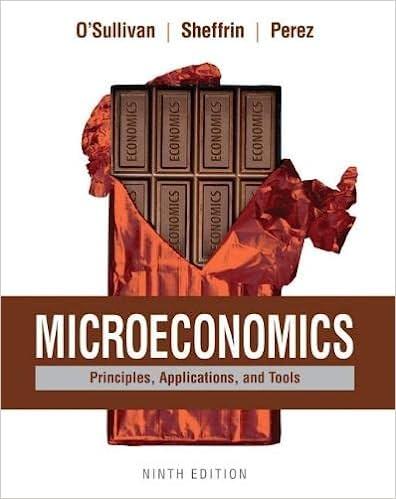The present bias that leads some people to smoke cigarettes raises an important policy question: Can we
Question:
The present bias that leads some people to smoke cigarettes raises an important policy question: Can we use taxes on cigarettes to offset present bias and actually make people better off in the process? A recent study concludes that to fully offset the present bias that underlies the decision to smoke, the appropriate tax is roughly $11 per pack of cigarettes.
The authors of the study focused on the effects of smoking on premature death. Smoking cuts the lifespan of the typical smoker by roughly 6 years, and given the economic value of 1!year of life, we can translate the cost associated with premature death into a cost of roughly $36 per pack of cigarettes. If! smokers did not suffer from present bias, their present choices would fully reflect this future cost, meaning that they would compare the benefit of smoking (the nicotine experience) to the full cost of a pack of cigarettes (the purchase price plus the!$36!cost associated with premature death). But present bias is sufficiently strong that a tax of roughly $11 per pack is required to ensure that the typical smoker considers the full cost associated with premature death. This tax puts the benefits and costs of smoking on an equal temporal footing: a tax of $11 moves the neglected future cost to the present, allowing a person to make choices that consider the full benefits and costs of smoking.
How would the cigarette tax affect low-income households? Because smoking is more prevalent among the poor, a cigarette tax imposes a relatively large tax burden on low-income households: lower-income households spend a much larger fraction of their income on cigarettes and cigarette taxes. The authors of the study suggest that the cigarette tax would actually be beneficial for low-income households. The reason is that low-income households are relatively responsive to changes in the price of cigarettes, so they would experience a relatively large reduction in smoking, and a relatively large increase in lifespan. Of course, the whole idea of the tax is to reduce smoking, and anyone who quits gets the benefit of a longer lifespan and avoids paying the $11 tax too.

Question.
What is the appropriate cigarette tax?
Step by Step Answer:

Microeconomics Principles Applications And Tools
ISBN: 9780134078878
9th Edition
Authors: Arthur O'Sullivan, Steven Sheffrin, Stephen Perez





